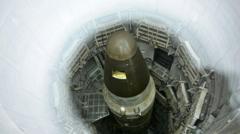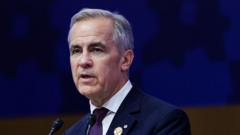Is Trump Restarting Nuclear Weapons Testing After 30 Years?

Published: 2025-10-30 03:00:22 | Category: technology
Former President Donald Trump has called for the United States to resume nuclear weapons testing, citing the need to keep pace with nations like Russia and China. This marks a significant shift in U.S. nuclear policy, as the country has not conducted such tests since 1992. Trump's announcement follows his condemnation of Russia's recent nuclear missile tests, highlighting the growing global arms race.
Last updated: 25 October 2023 (BST)
What’s happening now
Donald Trump has urged U.S. military leaders to initiate nuclear weapons testing as a response to advancements in nuclear capabilities by other countries, particularly Russia and China. In a social media post made shortly before a meeting with Chinese President Xi Jinping, Trump stated, "Because of other countries testing programs, I have instructed the Department of War to start testing our Nuclear Weapons on an equal basis." This announcement comes after years of U.S. policy that has refrained from nuclear testing since the end of the Cold War.
Key takeaways
- Trump's call for nuclear testing marks a reversal of U.S. policy established after the Cold War.
- The last U.S. nuclear test occurred on 23 September 1992.
- Russia and China are advancing their nuclear capabilities, prompting U.S. military leaders to reassess their strategies.
Timeline: how we got here
The timeline of U.S. nuclear testing and policy changes is crucial for understanding the current situation:
- 23 September 1992: The last U.S. nuclear weapons test, code-named Divider, occurs at the Nevada Test Site.
- 1993: President Bill Clinton extends the moratorium on nuclear testing, reinforcing non-proliferation efforts.
- 2000s: The U.S. continues to maintain its nuclear arsenal without testing, focusing on modernization instead.
- 2018: The Trump administration expresses intentions to modernize the nuclear arsenal but remains committed to the moratorium.
- October 2023: Trump announces plans to resume nuclear testing amid concerns over Russia and China's military advancements.
What’s new vs what’s known
New today/this week
Trump's recent statement signifies a shift in U.S. nuclear policy, suggesting immediate preparations for testing nuclear weapons. This development comes as he meets with Xi Jinping, raising questions about international relations and arms control.
What was already established
The U.S. has not conducted nuclear tests since 1992, following a moratorium that began as the Cold War ended. This long-standing policy has aimed to promote global nuclear non-proliferation and prevent an arms race.
Impact for the UK
Consumers and households
The potential resumption of nuclear weapons testing may have indirect implications for UK consumers, particularly in the realm of international relations and security. Heightened tensions could affect trade agreements and economic stability.
Businesses and jobs
UK businesses involved in defence and technology sectors may feel the impact of increased U.S. military spending and a potential arms race. Companies might need to adapt to new regulations or opportunities arising from these developments.
Policy and regulation
The UK government may need to reassess its nuclear policies in light of U.S. actions. This could lead to discussions on collaborative defence strategies and the UK's role in global nuclear non-proliferation efforts.
Numbers that matter
- 1: The number of nuclear tests conducted by the U.S. since 1992.
- 105 km: The distance from Las Vegas to the Nevada Test Site, where U.S. nuclear tests were previously conducted.
- 1,054: The total number of nuclear tests conducted by the U.S. up to 1992, showcasing the scale of past nuclear development.
- 5 years: Timeframe in which Trump predicts China’s nuclear capabilities will significantly advance.
Definitions and jargon buster
- Nuclear weapons: Explosive devices that derive their destructive force from nuclear reactions.
- Moratorium: A temporary prohibition on an activity, in this case, nuclear testing.
- Non-proliferation: Efforts to prevent the spread of nuclear weapons and weapons technology.
How to think about the next steps
Near term (0–4 weeks)
In the short term, observe any official announcements from the U.S. Department of Defense regarding the logistics of resuming nuclear tests. Monitor diplomatic communications between the U.S., Russia, and China.
Medium term (1–6 months)
Watch for the potential implications on international treaties and agreements, particularly those related to nuclear non-proliferation. The UK's response and policy adjustments will also be critical in this timeframe.
Signals to watch
- Statements from military leaders regarding the resumption of testing.
- Responses from Russia and China concerning U.S. nuclear policy changes.
- International diplomatic meetings focused on arms control and nuclear disarmament.
Practical guidance
Do
- Stay informed about developments in nuclear policy from reliable sources.
- Understand the implications of nuclear testing on global security dynamics.
- Consider the impact of U.S. military strategies on international relations.
Don’t
- Assume that nuclear testing will not affect international stability.
- Ignore the potential economic implications for UK businesses.
- Overlook the importance of diplomatic channels in mitigating risks.
Checklist
- Review current U.S. nuclear policies and their historical context.
- Monitor news related to international nuclear agreements.
- Assess how changes in U.S. nuclear strategy could impact UK defence policies.
- Stay updated on the responses from other nuclear powers.
- Evaluate how this might affect your sector if you work in defence or technology.
Risks, caveats, and uncertainties
While Trump's call for nuclear testing signals a significant policy shift, the execution of such tests remains uncertain. The U.S. must navigate international law and existing treaties. Additionally, potential backlash from global powers could escalate tensions and complicate diplomatic relations.
Bottom line
The potential resumption of nuclear weapons testing by the U.S. represents a pivotal moment in global nuclear policy. As countries reassess their military strategies, the UK must remain vigilant, understanding the broader implications for international security and diplomacy.
FAQs
Why has Trump called for nuclear testing?
Trump's call for nuclear testing is a response to advancements in nuclear capabilities by countries like Russia and China, aiming to ensure the U.S. maintains its strategic advantage.
When was the last U.S. nuclear test conducted?
The last U.S. nuclear test occurred on 23 September 1992 at the Nevada Test Site.
How might this impact international relations?
Resuming nuclear testing could escalate tensions with other nuclear powers, complicating diplomatic relations and potentially undermining global non-proliferation efforts.



